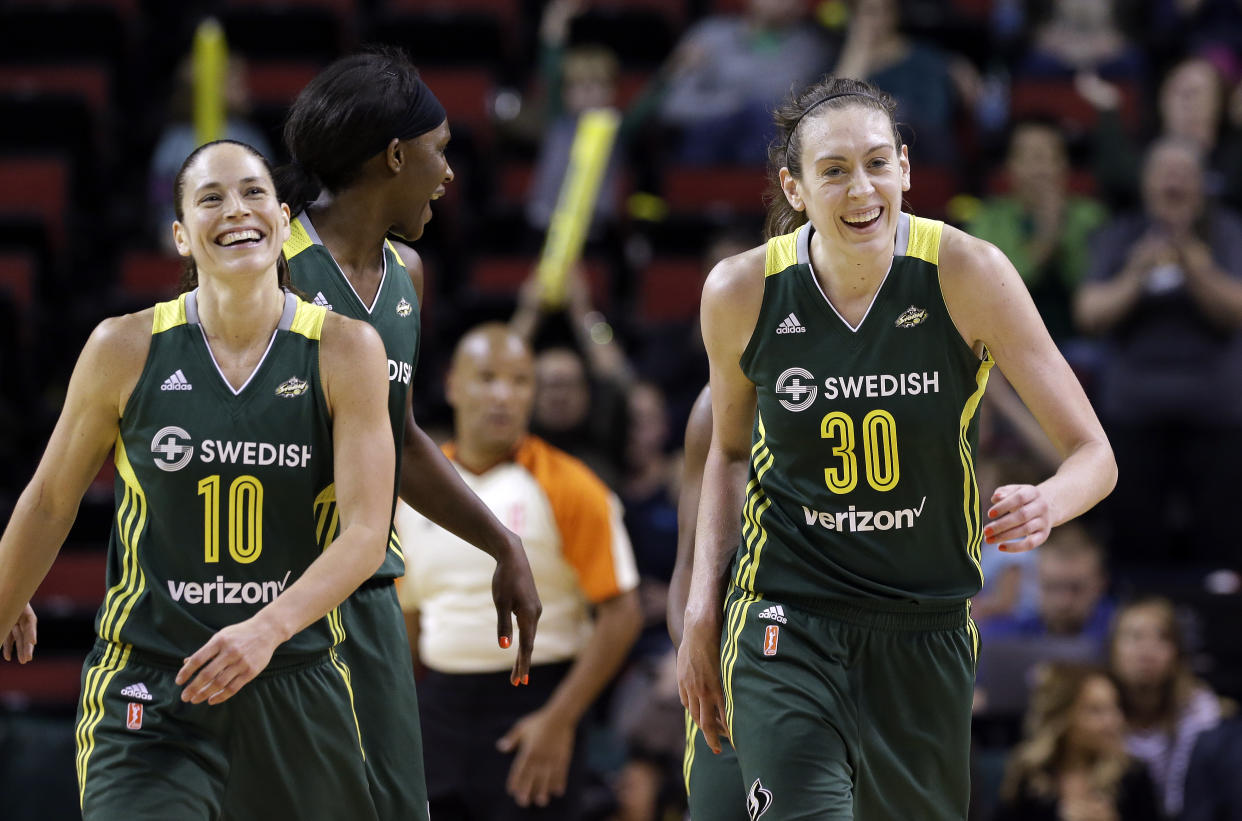Sue Bird, Breanna Stewart detail fertility journey to 'normalize' egg freezing

Seattle Storm superstars Breanna Stewart and Sue Bird had some unexpected time off after their 2018 WNBA championship. So they froze their eggs while rehabbing injuries that kept them away from the game.
The teammates, who are nearly 15 years apart, detailed their fertility process to the Washington Post’s Ava Wallace to “normalize” the procedure and options available for women athletes.
Egg freezing is used to save a woman’s eggs for use in the future. It’s usually used for women who have a condition that can affect fertility, are going through chemotherapy for cancer or are using in vitro fertilization. Elective egg freezing is also an option for young women to delay having children until later, when their career is established or when they’ve met a partner later in life.
Bird wants to be a pioneer advocate
Bird, 39, is a three-time WNBA champion and will go for a fifth Olympic gold medal at the Tokyo Olympics. She has been busy with her career since she was at UConn, and her partner, United States women’s soccer team superstar Megan Rapinoe, is just as busy with her own career while she’s at the height of it.
Bird has thought about freezing her eggs for years, per the Post, to at least give herself the option to have children down the road. While rehabbing from knee surgery, she went through with it.
She also sees it as an opportunity to bring the issue to the forefront and possibly fight for elective egg freezing down the road in collective-bargaining agreements. Most health plans, including the WNBA’s, don’t allow for the procedure, which can run on average $15,000 to $20,000 per cycle, with ensuing storage fees if they’re held longer than five years.
“As an athlete, this is a big thing,” Bird said. “Straight, gay, doesn’t matter. Your career is your body, and you need to keep your options open, in terms of starting a family. Obviously, there’s a lot going on in the world of female sports and specifically in the WNBA because we have our CBA coming up. Just to be a pioneer in that category, it would be great for a women’s league to start talking about these things, to maybe have these options for athletes.”
Most women’s basketball players go year-round with a season in the WNBA followed by one overseas where they make the bulk of their income. There is no breather, making it difficult to plan for a family while playing. And there is no guaranteed quick return after giving birth. For every Candace Parker — the Los Angeles Sparks star who in 2008 was fortunate enough to return 53 days after giving birth — there is a Skylar Diggins-Smith, who was bravely public about her difficulties with postpartum depression after having her baby boy this year.
Stewart wants to preserve her peak career time
Bird and Stewart attended a fertility meeting together set up by an agency focused on women in sports, per the Post. The 25-year-old is rehabbing a torn Achilles — she’s aiming to return next month for the national team’s exhibition against her alma mater UConn — and went through the procedure while out.
It requires multiple doctors visits and heavy doses of hormone medication for about 10 days before the retrieval. Patients can’t do heavy training or competition, and Stewart said she was bloated and unable to twist her body due to it. She also plays overseas.
Stewie is one of the thousands of young women who are taking action at a young age when they have more better-quality eggs to preserve. The average age of a woman getting the procedure is down to 35 in 2018 from 39 in 2016, per CNBC. The market is projected to grow 25 percent annually over the next two years, per Fertility IQ, with 10,936 women freezing their eggs in 2017.
Stewart, who had a historic 12-month run before her injury, told the Washington Post she was doing it so she doesn’t miss time.
“Talking to the doctor at SRM, she was just like, you’ll have perfect eggs right now because you’re so young and people don’t usually do this that young,” Stewart said. “ … Now I have the options that I have these eggs further down the line, because I don’t plan on missing a significant amount of time. I was like, all right, let me do something that looks toward my future. Now I don’t have to worry about playing year-round or going overseas, getting lost in my work.”
Stewie has spoken out about issues before. She called out the NCAA for what she called a lack of respect for the women’s game this past March. And in 2017, she shared her personal story of sexual abuse as a child in a “Me Too” piece for the Players’ Tribune.
More from Yahoo Sports:


